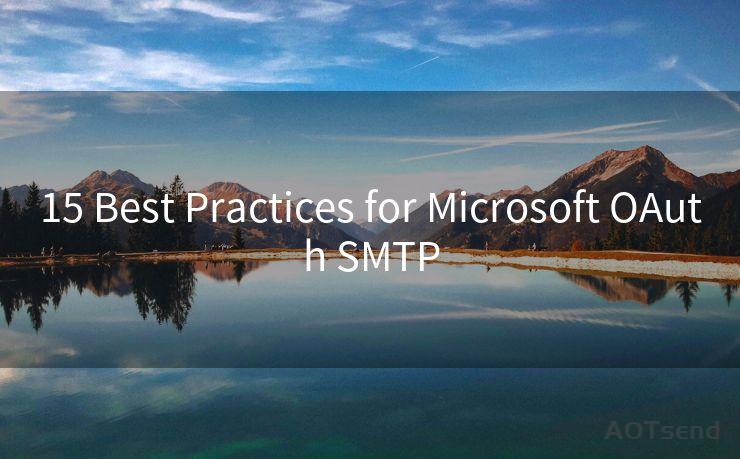15 Best Practices for Microsoft OAuth SMTP




When it comes to secure email communication using Microsoft services, OAuth SMTP authentication plays a pivotal role. OAuth, an open standard for authorization, allows third-party applications to obtain limited access to user accounts without using the user's password. In this blog post, we will explore the 15 best practices for Microsoft OAuth SMTP to ensure secure and efficient email delivery.
1. Understand OAuth Basics
Before implementing OAuth for SMTP, it's crucial to understand the basics of OAuth. This includes familiarizing yourself with the different OAuth flows, such as the authorization code flow, implicit flow, and client credentials flow.
2. Register Your Application
To use OAuth for SMTP, you need to register your application with Microsoft. This involves creating an app registration in the Azure portal and obtaining the necessary credentials, such as the client ID and secret.
3. Choose the Right OAuth Flow
Depending on your use case, choose the appropriate OAuth flow. For example, the authorization code flow is suitable for web applications, while the client credentials flow is ideal for server-to-server communication.
4. Securely Store Credentials
Never hardcode or expose your client ID, secret, or access tokens in your code. Use secure methods to store and retrieve these credentials, such as environment variables or secure storage solutions.

5. Implement Proper Error Handling
When implementing OAuth for SMTP, ensure you have robust error handling mechanisms. This helps identify and troubleshoot issues related to authentication and authorization.
6. Use the Latest Libraries
🔔🔔🔔
【AOTsend Email API】:AOTsend is a Managed Email Service for sending transactional emails. Support Email Types: reminders, authentication, confirmations, notifications, verification codes, invoices, password resets, account activations, billing statements, two-factor authentication (2FA), and one-time passwords (OTP) emails, etc. $0.28 per 1000 Emails. 99% Delivery, 98% Inbox Rate.
You might be interested in:
Why did we start the AOTsend project, Brand Story?
What is a Managed Email API, How it Works?
Best 25+ Email Marketing Platforms (Authority,Keywords&Traffic Comparison)
Best 24+ Email Marketing Service (Price, Pros&Cons Comparison)
Email APIs vs SMTP: How they Works, Any Difference?
Always use the latest libraries and SDKs provided by Microsoft for OAuth implementation. This ensures compatibility and security.
7. Scope of Access
Define the scope of access carefully. Only request the permissions you need for your application to function properly.
8. Token Expiration and Renewal
Be aware of token expiration times and implement mechanisms to renew tokens before they expire. This ensures uninterrupted service.
9. Monitor and Log
Monitor your OAuth implementation regularly and log all relevant activities. This helps in troubleshooting and auditing.
10. Secure Communication
Ensure that all communication between your application and Microsoft's OAuth servers is secure. Use HTTPS for all requests and responses.
11. Test in a Sandbox Environment
Before deploying to production, test your OAuth implementation in a sandbox environment. This allows you to identify and fix any issues without affecting live users.
12. Follow Best Practices for Password Resets
If your application supports password resets, follow Microsoft's best practices for securely handling these requests using OAuth.
13. Regularly Update Dependencies
Keep your OAuth libraries and dependencies up to date to ensure compatibility and security.
14. Educate Users on OAuth
Educate your users on the benefits and security features of OAuth. This helps build trust and confidence in your application.
15. Conduct Security Audits
Periodically conduct security audits to ensure your OAuth implementation remains secure and compliant with industry standards.
By following these best practices for Microsoft OAuth SMTP, you can ensure secure and efficient email communication within your application. Remember, security is an ongoing process, and it's essential to stay vigilant and up to date with the latest security measures.




Scan the QR code to access on your mobile device.
Copyright notice: This article is published by AotSend. Reproduction requires attribution.
Article Link:https://www.mailwot.com/p3813.html



